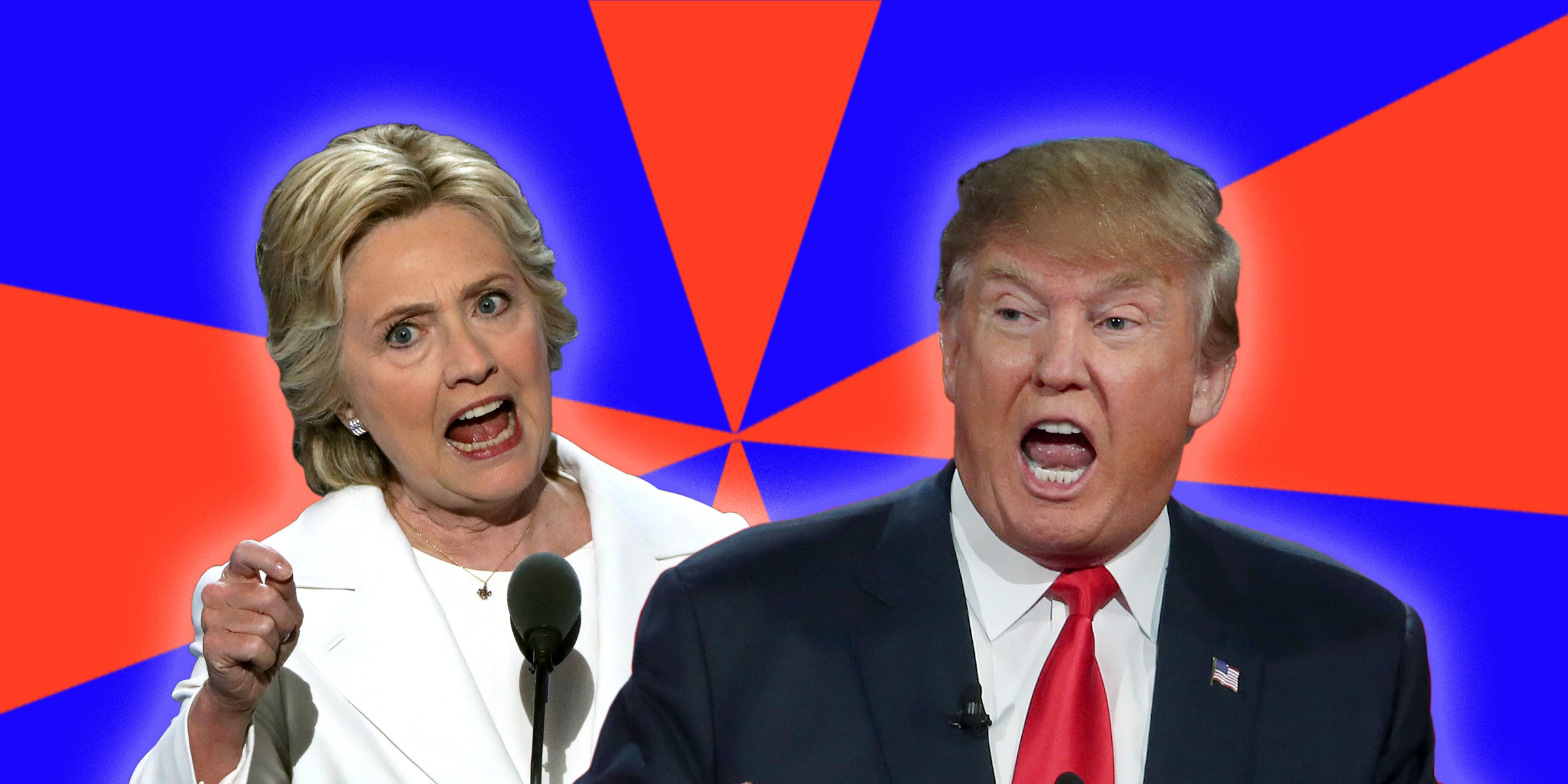The power of political memes
They're silly. They're short-lived. And they really, really matter.


A free daily email with the biggest news stories of the day – and the best features from TheWeek.com
You are now subscribed
Your newsletter sign-up was successful
Face it: Your Facebook rants about "Crooked Hillary" or "Donald Drumpf" probably aren't changing your friends' minds. Indeed, many of your pals probably smugly claim superiority over the partisan grousing clogging their newsfeeds in this most rancorous of elections.
And yet, the political memes that get passed around on Facebook, Twitter, Reddit, and elsewhere are one of the most compelling and vital forms of communication of the 2016 election. This is not just hyper-partisan noise; memes also represent the ongoing production of new forms of media literacy, cultivating valuable conversations about the role of politics in everyday life.
Consider the #TrumpSacrifices meme inspired by Donald Trump's tone-deaf response to Khizr Khan's Democratic convention speech, in which Khan directly addressed Trump, telling him, "You have sacrificed nothing!" Trump felt compelled to defend himself, claiming that he had "sacrificed" by creating jobs, creating a moment that was ripe for mockery by Twitter's activist jokesters.
The Week
Escape your echo chamber. Get the facts behind the news, plus analysis from multiple perspectives.

Sign up for The Week's Free Newsletters
From our morning news briefing to a weekly Good News Newsletter, get the best of The Week delivered directly to your inbox.
From our morning news briefing to a weekly Good News Newsletter, get the best of The Week delivered directly to your inbox.
These memes are often silly and short-lived. But they also circulate new forms of knowledge about the presidential election.
To be clear, any humorous image, video, or text with political content that circulates widely on social media qualifies as a political meme. Many of the best memes powerfully use popular culture as a clever tool for creating a shorthand commentary on political malfeasance and range from sarcastic hashtags to image macros that use popular culture to comment on or satirize political communication. Online political memes have existed for the last few election cycles, and arguably, they follow in a long line of political cartoons in newspapers and other professional forms of satire such as Saturday Night Live and The Daily Show. But they continue to receive little attention compared to other forms of election humor.
#TrumpSacrifices likely changed very few minds about the presidential race. But that is the wrong standard for measuring the effectiveness or meaningfulness of a political meme. The #TrumpSacrifices meme helped to define Trump as a candidate, and more crucially, provided politically engaged social media users with an outlet for expressing their perceptions not just about Trump but also about articulating political norms and values and how candidates should communicate their ideas. By mocking inappropriate comments and behaviors by politicians and pundits, social media users are implicitly defining how campaigns should be run.
Of course, it's certainly easy to look at Donald Trump's campaign and come to the conclusion that Twitter is leading to the devolution of American politics. Trump has notoriously insulted nearly everyone in his path — Muslims, Latinos, Native Americans, Mormons, and countless individuals — while mocking opposing candidates with childish nicknames, and his preferred mode of delivering these insults has been late-night tweets. Memes can also participate in the spread of misinformation and conspiracies, allowing false narratives to circulate and gain continued attention. This includes the #HillarysStools hashtag, which has been used to perpetuate the baseless rumor that Clinton has an undisclosed medical condition.
A free daily email with the biggest news stories of the day – and the best features from TheWeek.com
But political dialogue, especially when it is inflected with pop culture, can be pleasurable and powerful. And political memes provide one of the more accessible avenues for everyday citizens to participate in the political process.
Image macros — those images with scenes from popular movies or TV shows — have become an almost instantaneous way of circulating political commentary through entertainment culture. One popular recent meme imposed quotations from Trump onto images of the utterly self-aggrandizing Captain Nimbus from the cult TV series Futurama. In another, Trump was compared to the similarly shallow starlet Jenna Maroney from the NBC sitcom 30 Rock, with both images highlighting vacuous public remarks made by the GOP nominee. @EmperorTrumpatine cleverly links Trump to a notorious Star Wars villain while mimicking the candidate's formulaic writing style. Like most forms of satire, these words and images have a political point: Trump's misogyny, racism, and narcissism have no place in a serious political dialogue.
But of course, it's not just Trump. Political humorists have a lot of fun with Hillary Clinton's painful attempts to seem cool, too.
Political memes preserve the ephemeral. With a 24-hour news cycle, it's easy for some stories to get lost, but political memes can have a galvanizing effect, bringing attention to the underlying meaning of comments that might have otherwise been ignored. Image macros satirizing Melania Trump's plagiarism of a speech by Michelle Obama helped to keep that story from fading away in the midst of an eventful Republican convention. And the more recent #KatrinaPiersonHistory meme helped to call attention to a Trump spokesperson's improbable claim that Barack Obama, then a state senator in Illinois, was somehow responsible for the invasion of Afghanistan.
Most crucially, however, political memes are the raw material of political talk. They provide fodder for ongoing political conversations, allowing for informal and spontaneous efforts to define the ethical and moral limits of campaign speech. They are particularly well equipped for helping voters to identify falsehoods repeated on cable news and in other corners of social media. This form of political talk can also be responsible for incremental shifts in people's political attitudes. One tweet or Facebook posting may not "sway" a person's vote, but the aggregate of dozens of memes repeated over time just might.
Chuck Tryon is an associate professor of English at Fayetteville State University and author of three books, including Political TV and On-Demand Culture: Movies in the Age of Media Convergence. He has also written for The Chronicle of Higher Education, Alternet, Filmmaker Magazine, and The Raleigh News-Observer.
-
 How the FCC’s ‘equal time’ rule works
How the FCC’s ‘equal time’ rule worksIn the Spotlight The law is at the heart of the Colbert-CBS conflict
-
 What is the endgame in the DHS shutdown?
What is the endgame in the DHS shutdown?Today’s Big Question Democrats want to rein in ICE’s immigration crackdown
-
 ‘Poor time management isn’t just an inconvenience’
‘Poor time management isn’t just an inconvenience’Instant Opinion Opinion, comment and editorials of the day
-
 The billionaires’ wealth tax: a catastrophe for California?
The billionaires’ wealth tax: a catastrophe for California?Talking Point Peter Thiel and Larry Page preparing to change state residency
-
 Bari Weiss’ ‘60 Minutes’ scandal is about more than one report
Bari Weiss’ ‘60 Minutes’ scandal is about more than one reportIN THE SPOTLIGHT By blocking an approved segment on a controversial prison holding US deportees in El Salvador, the editor-in-chief of CBS News has become the main story
-
 Has Zohran Mamdani shown the Democrats how to win again?
Has Zohran Mamdani shown the Democrats how to win again?Today’s Big Question New York City mayoral election touted as victory for left-wing populists but moderate centrist wins elsewhere present more complex path for Democratic Party
-
 Millions turn out for anti-Trump ‘No Kings’ rallies
Millions turn out for anti-Trump ‘No Kings’ ralliesSpeed Read An estimated 7 million people participated, 2 million more than at the first ‘No Kings’ protest in June
-
 Ghislaine Maxwell: angling for a Trump pardon
Ghislaine Maxwell: angling for a Trump pardonTalking Point Convicted sex trafficker's testimony could shed new light on president's links to Jeffrey Epstein
-
 The last words and final moments of 40 presidents
The last words and final moments of 40 presidentsThe Explainer Some are eloquent quotes worthy of the holders of the highest office in the nation, and others... aren't
-
 The JFK files: the truth at last?
The JFK files: the truth at last?In The Spotlight More than 64,000 previously classified documents relating the 1963 assassination of John F. Kennedy have been released by the Trump administration
-
 'Seriously, not literally': how should the world take Donald Trump?
'Seriously, not literally': how should the world take Donald Trump?Today's big question White House rhetoric and reality look likely to become increasingly blurred
